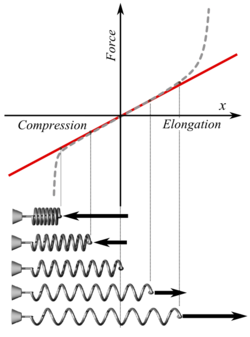Hooke's Law Calculator

A Hooke's Law Calculator is a tool used to calculate the force exerted by a spring or elastic material based on Hooke's Law. Hooke's Law describes the relationship between the force applied to a spring and the displacement or stretching of the spring.
Why is it important?
- Understanding Elasticity: Hooke's Law helps understand the behavior of materials and objects that stretch or compress when a force is applied. It's fundamental in fields like material science, engineering, and physics.
- Design and Engineering: It helps engineers and designers create objects or systems (like springs, shock absorbers, or suspension systems) that need to resist deformation under force.
- Structural Analysis: In construction and materials testing, Hooke's Law helps determine how structures or components will respond under load, ensuring safety and durability.
How is it calculated?
The force (F) exerted by a spring or elastic material is given by Hooke’s Law formula:
F = k ⋅ xWhere:
- F is the force applied to the spring (in newtons, N),
- k is the spring constant (in N/m), which represents the stiffness of the spring,
- x is the displacement or elongation of the spring from its equilibrium position (in meters, m).
Alternatively, in the case of a material that stretches, the stress and strain relationship can also be expressed using Hooke’s Law, where:
Stress = E ⋅ StrainWhere:
- Stress is the force per unit area (in pascals, Pa),
- Strain is the relative deformation (a dimensionless quantity),
- E is Young’s Modulus, which measures the stiffness of the material.
When is it used?
A Hooke’s Law Calculator is used in various scenarios, including:
- Engineering and Design: When designing spring-loaded mechanisms, shock absorbers, or any system involving stretching/compression of materials.
- Physics: In studies of elastic materials, understanding forces in springs, and in oscillations or harmonic motion (like a mass-spring system).
- Structural Mechanics: In building and testing materials for structures, ensuring they will handle applied forces without permanent deformation.
- Manufacturing: For testing products or components that will undergo stretching or compression in real-world conditions.
In summary, a Hooke's Law Calculator is a useful tool for understanding and applying the principles of elasticity, which is critical in designing systems that depend on elastic materials or components that stretch or compress under force.